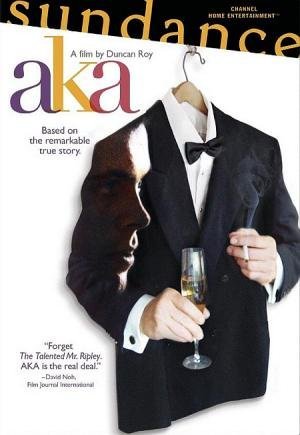
AKA
UK, 2002, 123 minutes, Colour.
Matthew Leitch, Diana Quick, George Astbury, Lindsay Coulson, Blake Ritson, Peter Youngblood Hills, Geoff Bell, Bill Nighy, Fenella Woolgar, Georgina Hale, Faith Brook.
Directed by Duncan Roy.
This first film was written and directed by Duncan Roy who uses the novelty of a tripartite screen throughout the whole film. This is always demanding and sometimes wearing as we have to make decisions as to which of the three images we want to look at. Since most of the film is set indoors, the device does enable us to watch characters and interactions are seen in closeup, different angles on the same scene, different pacings of the same scene, flashbacks centred between the current action.
Matthew Leitch portrays Dean, a lonely teenager from a poor family in Essex, 1978. Leitch is not the greatest actor but brings a solemn and ingenuous demeanour to his initially inarticulate character. Sexually abused by his father, encouraged by his fearful mother to be interested in the wealthy patrons of the restaurant where she works, he leaves home and, by a series of rather unbelievable accidents and luck, he finds himself mixing in wealthy society, assuming a rich man's identity and enjoying the high life. Troubled by his sexual experience, he is also trying to find his identity. The film is peopled by snobs, many decadent parasites as well as Dean's simple mother and the sympathetic investigator who tracks Dean down.
Not always well acted, many characters and events straining credibility, even though most of them in fact happened to the director in his own life. AKA is quite watchable in a fancy soap opera kind of way.
1. The impact of the film? Its style, the three-screen effect (not on the video or DVD)? The impact of the triple screen compared with the single screen? The focus on themes, characters? Way of storytelling?
2. London in the 1980s, the contrast with Essex homes, wealthy London, the square, the park, the homes, the galleries? Paris, the Riviera, Oxford? The musical score?
3. The film based on a true story? Its credibility? Issues of identity, sexual orientation? Envy, wealth, class?
4. The title, the theme of Dean’s impersonation of Alexander?
5. The portrait of Dean, his age, at home, quiet, his relationship with his mother, listening to her stories about the upper class? The relationship with his stepfather, the sexual abuse, the other members of the family? His angers, leaving home, going to the square, wandering? The man in the park, inviting him home, his staying there, the meal with the friends, the camp atmosphere, his curiosity, enjoying it? The meeting with Lady Gryffoyn? Her assistant? Talking with her, going to the restaurant – and his mother serving? Back home, the clash with the stepfather, his anger and being ousted, his mother leaving him outside?
6. Lady Gryffoyn and her help, meeting Alexander, the friendship, the clash, Alexander’s girlfriend and her sexual approach? His likeing, society, the party, his trying to adapt, the guests and their noticing that he was from Essex, their upper-class snobbery? His ignorance? His decision to go to Paris after the suggestion of the girl?
7. The arrival in Paris, with the dealer, claiming Alexander’s identity, the change of attitude? Respect for Lady Gryffoyn? His assuming Alexander’s identity, his skill in passing himself off, his enigmatic answers to questions? The meeting with David, in society, David and Benjamin taking him in? The bonds between the three? His observing the relationship between David and Benjamin? The parties, society, Freddy, Elizabeth of Lithuania and the other smart set people? His behaviour and enjoying it?
8. David, his story, taking him home, David and his relationship with Benjamin? Benjamin and his background at Studio 54, prostitute? His relationship with David, kissing Benjamin? His stealing the money, allowing Benjamin to be blamed? The trip to the Riviera, the three, Benjamin ousted, his playing with Benjamin on the beach?
9. David and the decision to go to Oxford, the surprise party, the character of his uncle, welcoming him? The investigators and the threat of exposure? Benjamin and his begging for some help, letting out his anger against Benjamin, their sexual encounter, telling him the truth?
10. The portrait of his mother, working, her relationship with her husband, not acknowledging what was happening to Dean? Her fussiness, the wrapped food in the refrigerator?
11. Lady Gryffoyn, society, her helping Dean, his taking her son’s identity, her being interrogated by the inquirers?
12. Alexander, personality, relationship with his mother, parties, looking down on Dean, snobbery?
13. David, society, a playboy, his relationship with Benjamin, turning him out? Taking Dean/Alexander to Oxford? The discovery of the truth – and the taunt that one day Dean might assume his identity?
14. Benjamin, his relationship with David, the American, from Texas, Studio 54, his bad relationship with his family? Prostitute? Living off David? Interest in the relationship with him? Begging, the sexual encounter, learning the truth? The postscript of his dying from AIDS?
15. The sketch of the uncle, his place in the family, welcoming Alexander, the party?
16. The sketch of people and society, their idle life, wealth, the arts? Snobbery?
17. The investigators, Dean and his use of the credit card, the company examining his expenses? The two investigators, the main man and his being looked down on after being in Oxford, his chubby associate? Their pursuing the investigation, the interviews with Dean’s mother, with Lady Gryffoyn? Tracking him down, finding him at the party?
18. The sketch of the various reactions to knowledge that Dean had impersonated Alexander? Interest, amusement, tolerance?
19. Dean in prison, serving his sentence, the guards and their humorous remarks about his identity?
20. The overall impact of the film, a working-class boy envious of the wealthy class, status in society? Issues of sexual abuse, dysfunctional families? Sexual orientation?